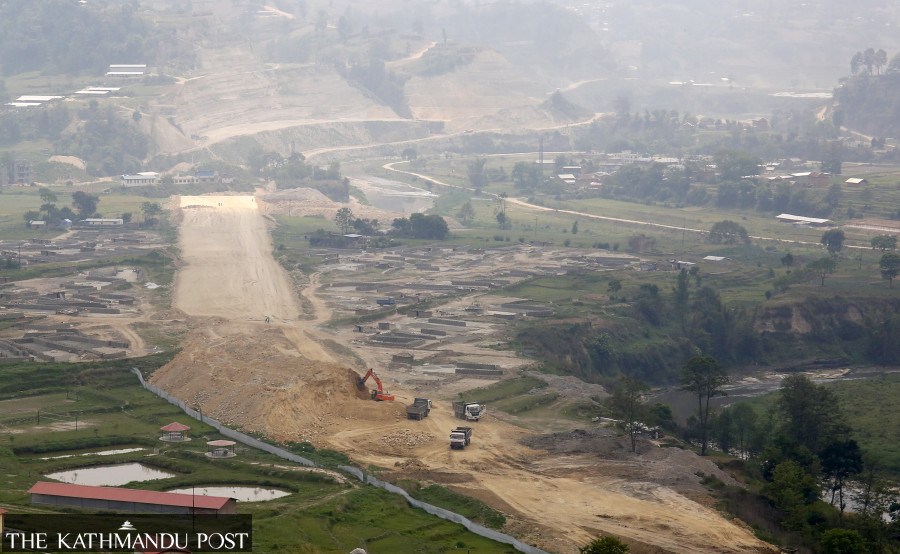
In this file photo, vehicles are being employed for the construction of Kathmandu-Nijgarh expressway at Pharsidol in Lalitpur on Saturday. Anish Regmi /TKP
The Nepal Army in August 2017 started the construction of the Kathmandu-Tarai Expressway with a plan to complete it in four years. Since the project was nowhere near completion by August 2021, its deadline was extended to July 2024.
The delay in the preparation and endorsement of the detailed project report prompted the army to further postpone the deadline to December 2024. Even as the deadline has been extended twice, it is uncertain if the expressway will come into operation by the end of 2024.
Sluggish construction work coupled with uncertainty in budget allocation could further delay the project’s completion. The national defence force, which is managing its construction, says it will complete 21 percent of the project work by the end of the current fiscal year, which marks five years since the construction began. The army must complete over 25 percent of the work every year to meet the deadline.
“We can complete the project work by December 2024 if there are no problems,” Brigadier General Bikash Pokharel, chief of Kathmandu-Tarai Expressway, said in a press meet on Tuesday.
The Khokana area is the entry point of the project. However, the government hasn’t been able to acquire 411 ropanis of land for the expressway and an additional 300 ropanis for the construction of parking space and a port. A committee under the National Planning Commission last year attempted to convince the local residents to sell their land but failed. Similarly, efforts by the parliamentary committees too have not yielded positive results.
The locals have been refusing to hand over their land saying five different projects are underway in the Khokana area and this might ultimately displace them from their land, according to the army officials. In addition to the expressway, an electricity transmission line, an outer ring-road and the Bagmati Corridor pass through the area. Similarly, the government is also developing Khokana as a smart city.
“It is up to the government to decide this matter,” said Pokharel.
The army has spent Rs25 billion in the last four and a half years since it started working on the project, with the government allocating Rs 8.92 billion in the current fiscal year alone. As per the detailed project report, the estimated cost of the highway, which will be of Asian standards, stands at Rs 175 billion with Value Added Tax and Rs 213 billion with the contingency and service charges.
The army will need Rs 188 billion in the next three years to complete the project, which means the government must allocate an average of around Rs 62 billion annually. The amount is more than the total budget of the Ministry of Defence, which stands at Rs51 billion, in the current fiscal year.
The army has said it will need a minimum of Rs 40 billion in the upcoming fiscal year to construct tunnels and other infrastructure for the project.
The expressway has three tunnels with a total length of 6.415 km that will be constructed in three different sections of the highway. Similarly, out of 86 bridges along the expressway, 16 have been categorised as special ones requiring international contractors for construction. The fast track is expected to reduce the travel duration from Kathmandu to Nijgadh, Bara, to one hour.
“We have already communicated with the Ministry of Defence and Finance,” said Pokharel. “We have been told that the government will ensure the needed budget.”













